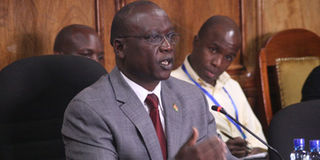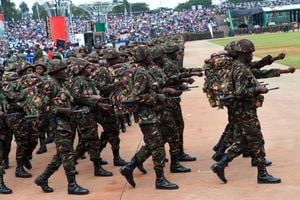Police bosses at risk of losing jobs

PHOTO | FILE Mr David Kimaiyo before the parliamentary committee on national security, chaired by Mr Fred Kapondi, at Parliament Buildings on December 20, 2012.
What you need to know:
- Iteere’s former deputy among the over 1,200 unit directors and commanders whose ranks have been scrapped, exposing them to the sack or demotion
At least 1,200 top police officers could lose their jobs after their positions were abolished in a new command structure to be unveiled early January.
This follows the appointment of Mr David Kimaiyo as the first Inspector-General of Police on Monday. He replaced Mr Matthew Iteere, who automatically retired after opting not to apply for the job he held for four years.
Among those facing the prospects of early retirement or redeployment to junior positions is Mr Francis Okonya, who was Mr Iteere’s principal deputy. He holds the rank of Senior Deputy Commissioner of Police (SDCP) 1, which has since been scrapped.
He applied for the posts of deputy Inspector-General and director of criminal investigations but he did not impress the National Police Service Commission (NPSC).
This means that if Mr Kimaiyo retains Mr Okonya in the senior hierarchy, he would at best be placed at Senior Superintendent of Police or assistant IG, which is at least four ranks below his current post. But this would also depend on whether he is cleared by the NPSC, which is vetting all senior police officers
“Looking at the scale of those officers, their integrity, and considering their competencies, it’s inevitable some of them may not necessarily remain the service,” said NPSC chairman Johnston Kavuludi.
Other officers in rank of SDCP1 are GSU Commandant William Saiya, Kenya Police College Commandant Peter Kavila and CID Director Ndegwa Muhoro. Mr Muhoro has since been proposed for the position of either deputy IG in charge of Kenya Police or the head of the Directorate of Criminal Investigations— the renamed CID.
The new structure has abolished six ranks including that of the Commissioner, SDCP1, SDCP2, Deputy Commissioner of Police (DCP), Senior Assistant Commissioner of Police (SACP), presently held by about 1,200 officers across all police units.
Other senior officers to be affected include unit directors Charlton Murithi (personnel), Jonathan Koskei (reforms) Silas McOpiyo (logistics) and Njue Njagi (operations).
Provincial police officers, who are DCPs, will also get new mandates. They include Moses Ombati (Nairobi), Aggrey Adoli (Coast), John Mbijiwe (Rift Valley), Joseph ole Tito (Nyanza), Alfred Ombamba (Western), Philip Tuimur (North Eastern), Francis Munyambu (Central) and Marcus Ocholla (Eastern).
Mr Kimaiyo told Saturday Nation that mass transfer and sacking of officers would not cure all the problems facing police department in a bid to transform it from a force to a service.
“We need to change the attitude and culture of our officers. In our ranks we have some of very disciplined and informed officers. With the right instructions, I want to make sure that each one of them can make swift and very firm decisions when performing duties,” he said.
Section 7 of the National Police Service Act dictates that the commission should conduct vetting to assess “suitability and competence” of officers.
“The Commission shall discontinue the service of any police officer who fails in the vetting,” it adds.
Once Mr Kimaiyo’s deputies in charge of Kenya Police and Administration Police have been appointed, the next level of officers would assume the rank of assistant IG’s followed by senior superintendents who in the current establishment are division police commanders (OCPDs).
It is the first time that all units of police including the investigative arm— CID, the paramilitary GSU, Regular and Administration Police, all with a total of 70,000 officers, will fall under one commander.
The NPSC is part of the three pillars established by the Constitution to transform and oversee policing in Kenya. Other key institutions are the Independent Policing Oversight Authority (Ipoa) and now the office of the IG.
Ipoa, headed by Mr Macharia Njeru, was created in June and Mr Kavuludi, the NPSC chairman, took office in October, after a protracted showdown between offices of the President and Prime Minister after the two principals differed the on officials to be appointed.
Creating the institutions was long overdue as they ought to have been functional almost two years ago, going by a schedule in Justice Ransley Commission report on police reforms— the document adopted by the government as a blueprint in transforming the force.
Ipoa is a civilian body mandated to receive and investigate complains against the police, including extra-judicial killings while the commission is responsible for recruitment, discipline, promotion and deployment of officers.




